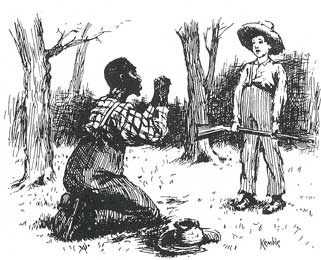NewSouth Books plans to release an edition of Huckleberry Finn in which Mark Twain’s 219 repetitions of the word “nigger” are replaced by “slave.” Doug Mataconis is unhappy about this. Minor offensive scenes can be  removed from movies that are aired on TV “without taking away from the central themes of the story,” he says, but:
removed from movies that are aired on TV “without taking away from the central themes of the story,” he says, but:
This is not the case with either Sawyer or Finn, both books are set in a time period when racial tensions were a central part of life and are based, to a large degree, on the racially prejudices that Twain himself encountered as a child growing up in Missouri. This is especially true of Huckleberry Finn where, despite the fact that “the n-word” appears 219 times, it’s fairly obvious that Twain is condemning racial prejudice and that one of the central themes of the book is the process by which Huck discovers that the things he’d been taught by society by blacks were wrong, and that his companion him was, in fact, an heroic figure. Twain’s use of a word that, even in his time, was meant to be insulting and demeaning, was deliberate and removing it because of “sensitivities” seems to me to detract significantly from the overall power of the novel.
I think I’d agree with Doug in nearly every other case. But the problem with Huckleberry Finn is that, like it or not, most high school teachers only have two choices these days: teach a bowdlerized version or don’t teach it at all. It’s simply no longer possible to assign a book to American high school kids that assaults them with the word nigger so relentlessly. As Twain scholar Alan Gribben, who led the bowdlerization effort, explained, “After a number of talks, I was sought out by local teachers, and to a person they said we would love to teach [Tom Sawyer] and Huckleberry Finn, but we feel we can’t do it anymore. In the new classroom, it’s really not acceptable.”
Given that choice, I guess I’d bowdlerize. After all, the original text will remain available, and teachers can explain the wording change to their classes if they want to. (Though even that’s probably difficult.) And frankly, I doubt that the power of the novel is compromised all that much for 17-year-olds by doing this. In fact, given the difference in the level of offensiveness of the word nigger in 2010 vs. 1884, it’s entirely possible that in 2010 the bowdlerized version more closely resembles the intended emotional impact of the book than the original version does. Twain may have meant to shock, but I don’t think he ever intended for the word to completely swamp the reader’s emotional reaction to the book. Today, though, that’s exactly what it does.
In any case, the only realistic alternative is that Huckleberry Finn vanishes from high schools and becomes a book taught solely at the university level. Maybe that’s better. But I doubt it.













